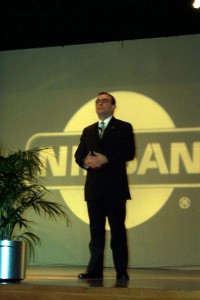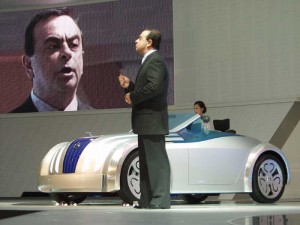
Ghosn, seen here during better times
Feeling the pinch of a worsening global meltdown, Nissan Motor Co. plans to trim 20,000 jobs and seek government assistance from both Japan and the United States.
As TheDetroitBureau.com reported, last week, the Japanese maker has been suffering serious problems both in its home market and in the U.S., its biggest foreign outlet. It’s a problem plaguing many of its Japanese competitors, including the industry giant, Toyota Motor Co., which will report a $4.5 billion loss for the fiscal year ending March 31. Nissan, meanwhile, will go $2.9 billion (265 billion yen) for the same period, CEO Carlos Ghosn announced on Monday.
“The global auto industry is in turmoil, and Nissan is no exception,” Ghosn revealed to reporters, following a meeting with Nissan staff.
The Brazilian-born executive, who also serves as CEO of Nissan’s French alliance partner, Renault, first came to Tokyo in 1999, when Nissan was nearing collapse. It survived only through a $6 billion cash infusion from Renault – and subsequent cuts initiated by Ghosn.

Ghosn with Ghosn
“In 1999,” Ghosn said, Monday, “we were alone. In 2009, everybody is suffering.”
The latest cuts will equal about 8.5 percent of Nissan’s total global workforce. Of the 20,000 jobs to be eliminated, 12,000 of those are in Japan. The automaker has already eliminated 2,000 contract workers in Japan, and cut thousands more jobs at operations overseas. In the U.S., it has offered early retirement to 1,100. A realignment of design, sales and marketing operations, announced last month, cost 110 American jobs.
The breakdown of the latest job reductions indicates a growing move away from production in Japan – where Nissan is feeling the heat from an increasingly high-valued yen – to foreign “transplant” assembly lines, such as the one in Canton, Mississippi that produces an assortment of passenger car and light truck models.
But that factory serves as an example of the problems Nissan has faced, in recent years, even before the current industry meltdown. While the Altima sedan produced in Mississippi is selling well, demand for the Titan pickup and Infiniti QX56, a full-size luxury SUV, have fallen far short of expectations. Production of the QX is being shifted back to Japan. Meanwhile, Nissan will end production of the Titan, and start marketing a new pickup wearing that badge but based on the Dodge Ram and produced at a Chrysler assembly plant.
A challenge for Nissan is not to cut too deeply, so, “You’d be ready to restart immediately when the crisis is over,” said Ghosn. And one way to do that will be through a “work-sharing program, in which two or more skilled employees would share a job – at a reduced pay level. That approach must still win union approval. Ghosn also expressed interest in switching to a four, rather than 5-day, week, in Japan.
Senior managers, meanwhile, will see their salaries reduced by 5 percent, while corporate officers will take a 10 percent pay cut. Nissan’s board of directors will forgo bonus pay entirely.
During the announcement, Nissan officials noted they’d suffered an 18.6 percent decline in worldwide vehicle sales, during the third quarter, which ended December 31, with volume sliding to 731,000. The downturn has largely been led by the U.S., where Nissan’s numbers were off 29.7 percent, in January. But the home Japanese market is in a meltdown, as well, recent months’ sales falling to their lowest levels in 35 years.
